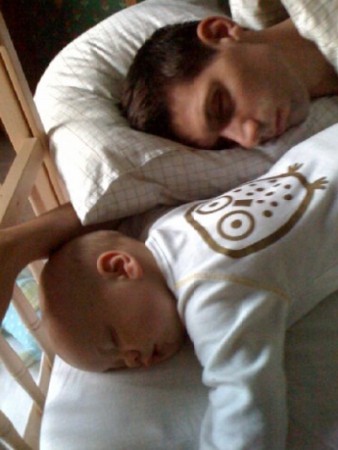The Science of Sleep
1 december 2010 | In parenting Psychology Self-indulgence | Comments?
Background
A few years back when, driving my supervisors to despair, I suddenly became interested in everything, I did some semi-serious reading about sleep. Sleep, it turned out, is poorly understood. There are a lot of theories, but nothing much solid, about the function of sleep and how that function is carried out. Memories are consolidated during sleep, that much seems clear, meaning that if you’re in an information-heavy line of work, taking the occasional nap is probably a good idea. The need for sleep seems obvious. Of course we need to ”recover”. We get tired in the same sense that we get hungry, i.e. via a bodily feeling that reminds us that something needs to be done. But this ”of course” carries little actual content. WHY do we need to sleep? What is this recovering all about? And could it be done in another way? If it is something that needs to be replenished, couldn’t this be done artificially, and quicker?
During the more intense period of writing in my life, I’ve been nearly angry with the need to sleep. Don’t get me wrong: I love sleeping. That is, I love the fringe bits of it. The beginning and the end, basically. The unconscious part, I could do without (or could I? That’s what I want to find out).
Sure, there is something, well, relaxing about the fact that everyone powers down for 6-8 hours a day. I guess it keeps the general pace down and that, at least, seems sort of desirable. But some more thorough counter-factual thinking needs to be done about what would happen if we got rid of the need to sleep. The necessity of shelter would probably be less of an issue, for instance, which would make more diverse lifestyles possible. Having a home, and a fixed address, would become (more) optional. Society would crumble, or flourish, or both.
To the point
Having been a practicing parent for almost a year now, sleep – and the lack of it – has once again become a central topic. Why does the baby refuse to sleep for more than an hour, and what should we do to make things better? There are recommendations and, as so often in this neck of the woods, the recommendations are contradictory. Don’t pick the baby up. Do pick the baby up. Comfort. Don’t comfort. You’ll make the baby insecure if you don’t. You’ll make the baby dependent if you do. And so on. In the advice literature, almost regardless of the topic, there is a gap between what science says and what the experience of experienced parents tells. The situation is not made better by the fact that the science in this domain is, like its main subject matter, in its infancy. And even if the science of sleep where in a better state, it’s not always the case that understanding a phenomena leads to a way of coping with it.
Sleeping babies are, in two distinct ways, just barely the domain of psychology. First: sleeping is, mostly, an unconscious process. It’s as much a matter for physiology, neurology, biology and chemistry, as it is for psychology. Second: babies are in the process of becoming fit subjects for (folk) psychology proper. We don’t quite get them, since our reasons for poor sleep (chili eaten late, result of funding application due tomorrow) are not theirs. Nevertheless, the interaction we have with our kids is very much a psychological affair, and its almost impossible not to psychologize the explanations we use in such interactions. We even do it with computers, for crying out loud.
The contradictory advice currently given is that it is important with habits: the same procedure every night. But also: you must experiment with conditions, to find what’s right for you and your baby. As luck would have it, I’ve got a few months to figure it out.